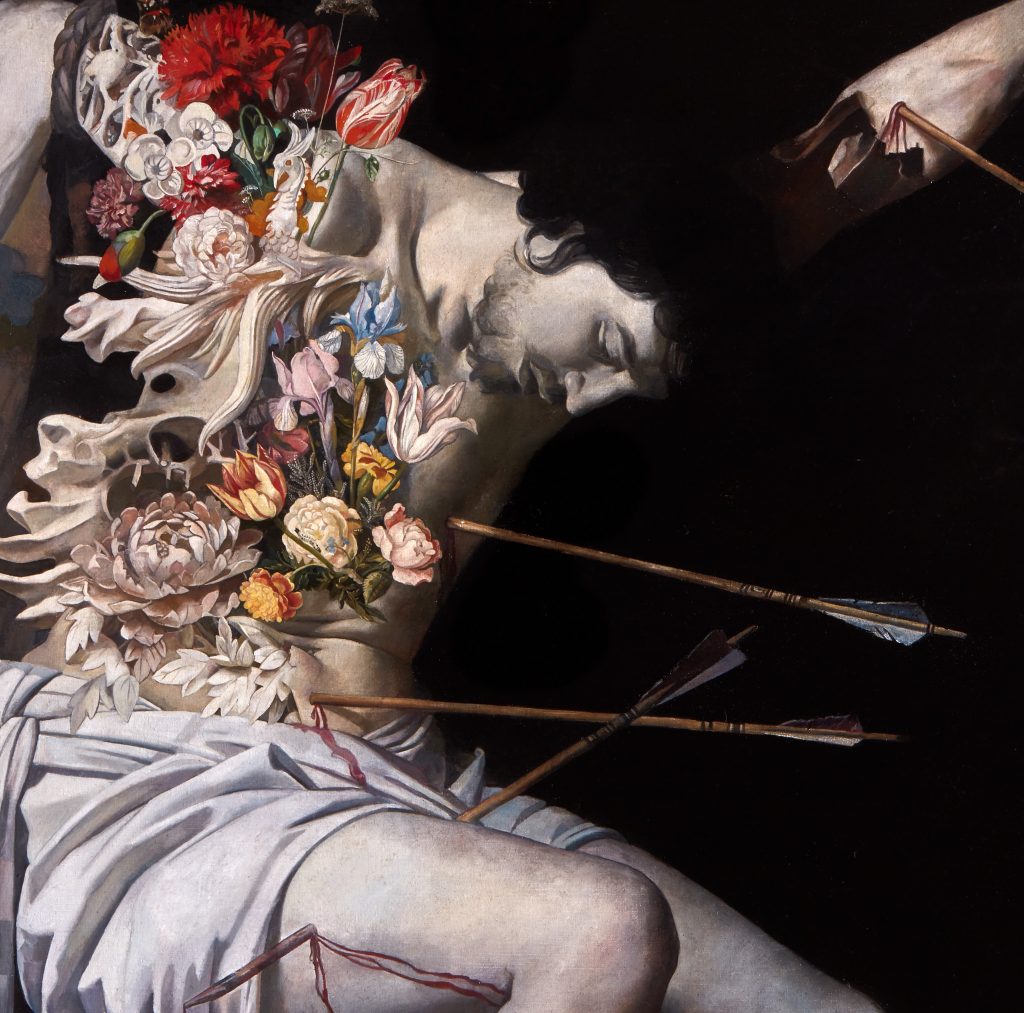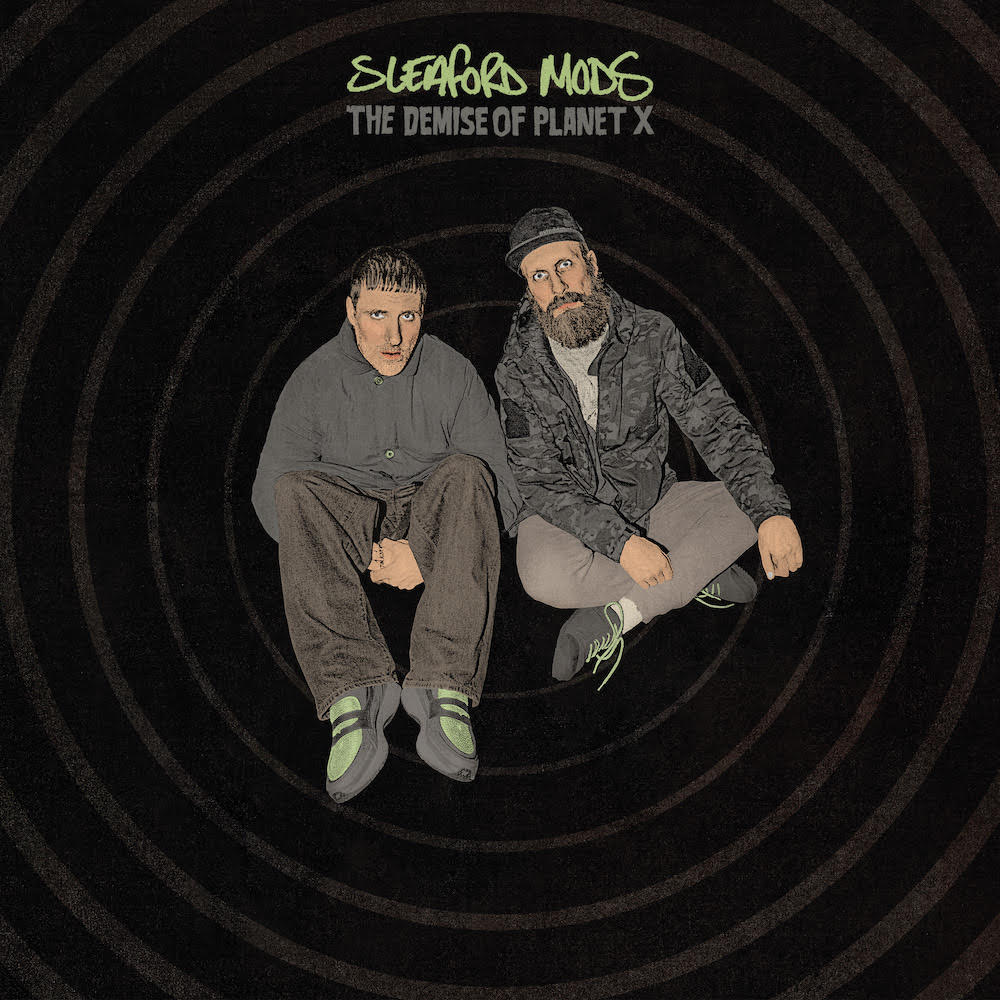« Ce n’est qu’une illusion terrestre de croire que les minutes se succèdent comme les grains d’un chapelet et qu’une fois disparues, elles le sont pour de bon » écrivait Kurt Vonnegut Jr. Il est certain que notre perception du temps et de ce qui gravite autour, à la vitesse de la lumière, nous échappe grandement. Vaguelettes que nous sommes à l’échelle de l’univers où les mythologies que nous nous inventons forment autant de mondes parallèles qu’un esprit vagabond pourrait en imaginer les plus épiques épitaphes individuelles. L’après-vie d’une petite mort rêvée où la réalité semble n’être, en somme, qu’une vaste trahison… En ce sens, la formation anglaise The Sirens of Titan, menée par John-Paul Pryor et Jez Leather, nous revient d’outre temps en mélangeant allègrement les époques comme s’ils étaient passés par un multivers jouissif pour nous offrir une nouvelle clé de voûte discographique nommée « Age Of Treason ». Dans cet album, les deux compères élargissent leur palette, passant par un prisme plus riche que jamais, tantôt rock, tantôt psychédélique, tantôt folk. Un plaisir complet tant au niveau des orchestrations subtiles de Jez Leather que par la voix de crooner de John-Paul Pryor, chaude et langoureuse. L’ensemble fait tout le charme de cet édifice esthétique qui n’a rien à envier à son prédécesseur de 6 ans son aîné, tant l’opus abonde d’inspirations transcendantales, de formules sonores magiques et autres scénographies musicales luxuriantes, lesquelles apportent, aux textes à la beauté tranchante, un éclairage tout particulier. Dans cette vraie ligne de vie cohabitent tensions et tentations, avec au milieu l’envie des désirs. Utopies, dystopies, nonchalances, venimeux esthétisme sublimé.
The universe of « The Sirens of Titan » could be described as melodious with extreme sensitivity. But how would you define your universe?
JP: I would define it as being evocative of my inner dreamtime – The Sirens of Titan is basically my internal landscape in terms of the lyrics. I suppose there is a sensitivity in there that I hope will resonate, and maybe something that brings a feminine side to the fore at times. It’s a universe that tries to transmit a kind of classicism in terms of the sound, and that is about wearing our influences very much on our sleeve. In a poetic sense,I would say that our universe is an analogue dream machine that reaches into an archetypal sonic past and hopes to speak very much to the present moment, pulling into its sway many of the larger themes of the zeitgeist, such as the clash of religious belief and scientific rationalism. It’s essentially about mapping some kind of moral trajectory in a sad and imperfect world.
JL: Melody is the most important aspect in all the music I help create. I have never been a chord guy, I find them too restricting, although useful as part of the language of playing with other musicians. I generally build up melodies and countermelodies that combine and define the chords of the song, which can then be easily mutated by playing with one or other of the melody lines. The Sirens’ musical universe is defined by those shifting melodies and the interplay of all of the subtle interpretations the wonderful musicians in the band and beyond bring to the table. There are many layers beneath and JP’s vocals ride over the the surface hammering in the essential nails at the exact spots that require fortifying, else the song collapses through its untethered fragility.
Your new album, Age of Treason, was released this summer. It is finally a new chapter that opens for you. Was it also a way to reinvent yourself by taking back the thread from your 1st album in 2017?
JP: I think that is a fair comment. We had intended for Age of Treason to be released by spring of 2020 but then, of course, the world was thrown into the dark days of the pandemic, and it was during that time that we evolved the sound further and started writing songs that we would then add to the record. I suppose we wanted to show that we were not just this acoustic-led stripped back outfit and had a lot more to offer. Apocalypse Sessions was always intended as a concept album, being extremely live and sparse. It didn’t represent our whole story as musicians, and we wanted to expand on what The Sirens of Titan meant to us and kind of live up to our name. We have an EP out soon that actually takes where we have reached on Age of Treason even further, teetering on the glittering edges of space rock. It’s called Lost Kingdom and it is kind of an addendum to the album, which has set a bar that we are determined to maintain and better.
JL: The Sirens are in a constant state of reinvention being ebbed along by the tumultuous times we live in. Looking back to the first album, we were a disparate bunch, even though our friendships were cemented during the recording of that album, we have totally different relationships with each other now and have a far more intimate knowledge and understanding of each other. This has led to, what I think is a really rich and fulfilling album that holds a lot of special memories, despite the background of recording being fraught with uncertainty and existential terror. And as JP has said, the bar is set, it’s fucking high and we can’t wait to for y’all to hear what’s next.
You did wonderful melodic work on this album. How was the composition process and how did you record this album?
JP: Most of the songs begin with me, an acoustic guitar and insomnia. I then bring these songs to Jez and we get to work on turning them into something far bigger. We have a kind of songwriting shorthand and have similar taste, so there is real synergy in how we work together. In some instances, though, such as the song ‘Bunny’, Jez will have come up with the melody and I will bring the lyrics. We then start layering up demos and get into the room with the band, and a pretty wide collective of musicians, and start recording live takes. Our relationship in terms of composition is moving into more cinematic territory at the moment, which is exciting.
JL: JP is a prolific rock’n’roll songwriting entity – I find it hard to keep up! But yeah, when he has a few days respite, I manage to dream up some space rock which he’ll magically turn into stardust when he adds his lyrics. When it comes to recording, the majority happens at our own Dynamite Jet Saloon studio where we can invite all our friends round to join our sonic community. Recording Age of Treason was primarily fun, full-on and first takes!
In this album, you put into music a form of touching duality, with a real ambivalence of feelings where hope and despair coexist. Was it the guideline that guided his writing?
JP: I think that is a really good way to describe what is going on in the music. I tend to live very much in a space that lies somewhere between hope and a belief in love and a kind of existential despair, and my songs probably reflect that. I have had moments where I have felt close to the edge of being and it is always music that pulls me through my personal struggles. I think we live in a world of extremely complex paradoxes and shades of grey and my lyrics probably do seek to reflect that ambiguity – it’s something like being spiritual in essence, but without the constraint of any kind of religion. I am creatively driven by ideas of eternal truth and beauty in the face of the void and the wasteland of human folly. I do feel rather ambivalent about the experience of reality – for me, it often feels as though being alive is simply passing through a dream, or being an eternal soul adrift in a temporal universe. I think my writing reflects that.
JL: That is at the heart of ours and most other people’s lives, and I’m touched that you can hear that reflected in our music.
The almost iconographic work of your visuals (covers and clips) further reinforces the romantic notion of romanticism. How did you develop this?
JP: There is something deeply romantic about the painting by Wolfe Von Lenkiewicz on the cover of the album, and that draw towards a surreal kind of romanticism comes back to this notion of classicism that is core to The Sirens of Titan. We are trying to transmit something that is beyond ourselves, and something that you can kind of lose yourself in. The dance of beauty and tragedy in Wolfe’s take on the Christian martyr St Sebastian being shot with plague arrows just spoke to me so strongly, especially during the pandemic, and we were very honoured for him to allow us to use his work for the cover of the album.
JL: I was blown away when JP told me Wolfe was going to let us use this painting for the cover of the album. We initially thought about putting the name of the band and the name of the album on the cover, but the image itself was so iconic we decided against it, and I’m so glad we did. With the clips, particularly the ones we filmed and directed, we really dived into our cinematic influences and surfaced with a nod and a wink to the classics, but we’ve also been very lucky to have some amazing directors come in and really embrace what our siren songs are calling out for to beautiful effect.

THE SIRENS OF TITAN - “Age Of Treason” - Atlantic Curve 25/08/2023
Crédit photo: Andrew Hobbs




